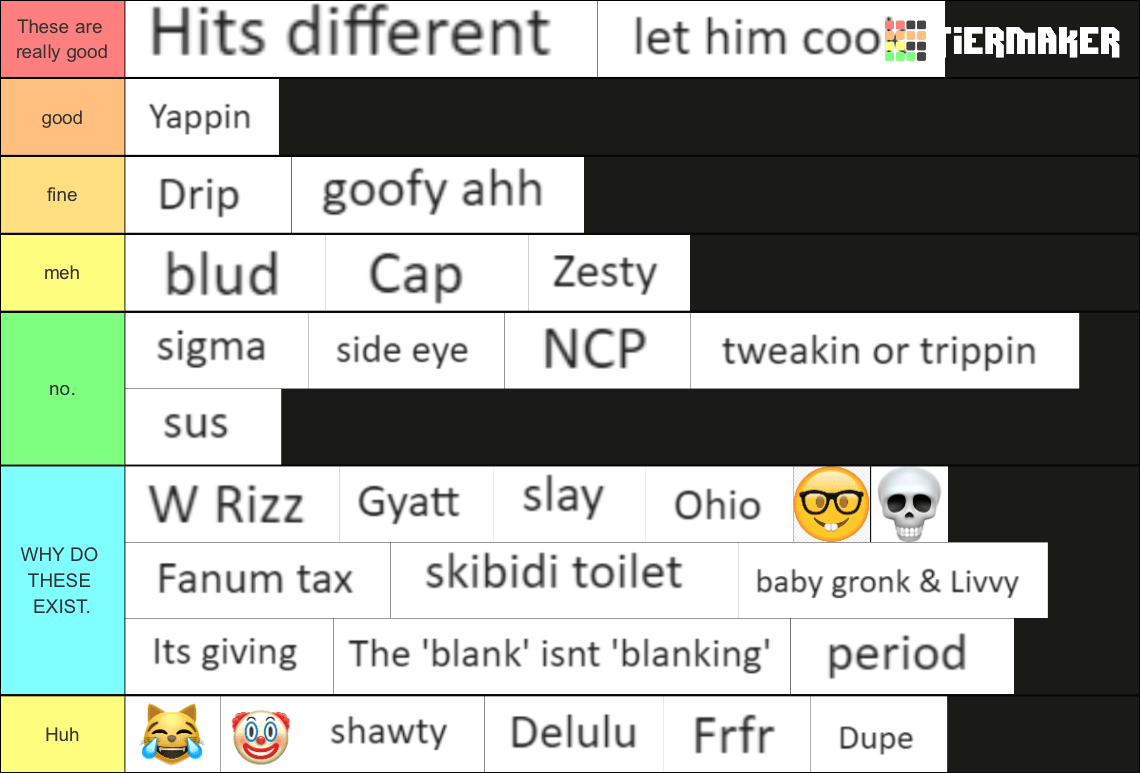As we delve into the fascinating world of language and communication, the emergence of Gen Alpha slang stands out as a testament to the creativity and innovation of today's youth. Born roughly between 2010 and 2025, Generation Alpha is growing up in a hyper-connected world where technology and social media play pivotal roles in shaping their interactions. This new generation is not only influenced by their predecessors but is also crafting a unique lexicon that reflects their experiences, values, and cultural shifts.
The slang used by Gen Alpha is more than just a collection of catchy phrases; it encapsulates their identity and serves as a means of connection among peers. As these digital natives navigate a landscape dominated by memes, TikTok, and constant online engagement, they are developing a rich tapestry of language that often leaves older generations scratching their heads. Understanding Gen Alpha slang is crucial for parents, educators, and marketers aiming to engage with this dynamic cohort.
In this article, we will explore the evolution of Gen Alpha slang, its significance, and some popular phrases that are making waves in their conversations. By the end, you’ll have a better grasp of how this new generation is communicating and what it reveals about their world.
What is Gen Alpha Slang?
Gen Alpha slang refers to the unique words, phrases, and expressions that are increasingly used by the youngest generation. As they grow up in the digital age, their language is heavily influenced by social media platforms and online culture. This slang often includes abbreviations, acronyms, and playful alterations of existing words.
How Does Gen Alpha Slang Differ from Previous Generations?
The language of Gen Alpha is distinct from that of Millennials and Gen Z in several ways. While previous generations relied on in-person interactions and traditional forms of communication, Gen Alpha is immersed in a digital landscape that fosters creativity and rapid evolution of language. Some key differences include:
- Increased use of emojis and visual elements in communication.
- Integration of memes and viral trends into everyday language.
- Rapid changes in slang terms, often influenced by current events and pop culture.
- Greater emphasis on inclusivity and representation in language.
What are Some Popular Gen Alpha Slang Terms?
To better understand Gen Alpha slang, let’s take a look at some popular terms that are currently trending among this generation:
- Lit: Used to describe something exciting or excellent.
- Bet: A term used to agree or confirm something.
- Flex: To show off or display something proudly.
- No cap: A phrase used to indicate that someone is being truthful.
Why is Understanding Gen Alpha Slang Important?
Understanding Gen Alpha slang is crucial for several reasons. For parents and educators, it fosters better communication and connection with younger individuals. For marketers and brands, it provides insights into the values and preferences of this generation, enabling them to tailor their messages effectively.
How Can Parents Engage with Their Children Using Gen Alpha Slang?
Engaging with Gen Alpha using their slang can help bridge the generational gap. Here are some tips for parents:
- Stay updated on trending phrases and terms.
- Ask your children about their favorite slang words and their meanings.
- Use slang in an appropriate context to show understanding and relatability.
- Encourage open conversations about language and its evolution.
What Role Does Social Media Play in Shaping Gen Alpha Slang?
Social media is a major driving force behind the creation and dissemination of Gen Alpha slang. Platforms like TikTok, Instagram, and Snapchat allow for rapid sharing of trends and language. Some ways social media influences their slang include:
- Viral challenges and trends that introduce new phrases.
- Influencers who popularize specific slang terms.
- Memes that convey complex ideas through simple phrases.
What are the Challenges of Gen Alpha Slang?
While the evolution of Gen Alpha slang is exciting, it also presents challenges. The rapid pace of language change can make it difficult for parents and educators to keep up. Additionally, the need for inclusivity means that slang can vary widely across different communities and cultures.
How Can Educators Incorporate Gen Alpha Slang in Learning?
Educators can leverage Gen Alpha slang to make learning more relatable and engaging. Here are some strategies:
- Incorporate slang into lessons about language evolution and cultural studies.
- Encourage students to create projects that explore the meanings and origins of slang terms.
- Use slang in creative writing exercises to inspire originality and expression.
What Does the Future Hold for Gen Alpha Slang?
The future of Gen Alpha slang is likely to be shaped by ongoing technological advancements, cultural shifts, and global events. As this generation continues to grow and develop their identities, their language will evolve, reflecting their unique experiences and perspectives.
In conclusion, Gen Alpha slang is not just a fleeting trend; it is a vital aspect of how this new generation communicates and connects with one another. By understanding and embracing this language, we can foster better relationships and navigate the complexities of our ever-changing world.
Marta Ochoa: The Journey Of A Remarkable Life
Madisyn Shipman: From Nickelodeon Stardom To Playboy Aspirations
Unraveling The Legacy Of Butterbean Boxer


